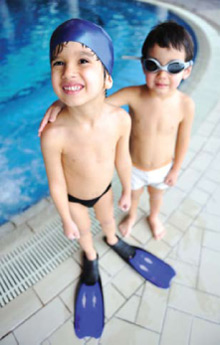Exercise is an important part of a healthy lifestyle; but sometimes, in those who suffer from asthma, exercise may present some challenges. Exercise can often be a common trigger of asthma symptoms, especially in children. Asthmatics may tend to exercise less than they should; however, with proper management and control, having asthma should not stop your children from participating in sports or other physical activities.
Why does exercise sometimes trigger symptoms in asthmatics?
One of the main reasons that trigger asthma symptoms is the cool, dry air that is inhaled during exercise. Children tend to breathe quickly, shallowly and through the mouth when they exercise or play vigorously. The air is actually warmed up when it passes through the nose, and when this process is skipped, cool, dry air reaches the lungs instead. This air causes narrowing of the airways in the lungs, blocking the airflow and making it harder for your child to breathe, thus producing asthma-like symptoms.
What are some of these symptoms?
Some of the symptoms include wheezing, tightness/pain in chest, coughing, and/or prolonged shortness of breath.
Should my asthmatic son be allowed to play any type of sport then?
Asthma should not be used as an excuse to avoid all types of physical activity. In fact, it is just as important for asthmatic children to get all their exercise that they need, as it is for other children. Successful asthma management would be able to prevent any asthmatic symptoms that may occur during exercise, such as cough or chest tightness.
There are also some kinds of exercises/sports that are better for asthmatics, including swimming; short bursts types of exercise, eg sprinting; walking/jogging; and gymnastics.
Could my child still take part in endurance sports if he/she truly enjoys them?
It is possible for your child to take part in endurance sports if he/she truly enjoys them. Endurance sports, such as cycling or long-distance running, as well as those that require extended energy output, eg football, may be more challenging for asthmatic children. However, with proper control and management of their asthma, ie taking preventive measures or precautions, one can participate in any sport that they choose without many complications.
What are some of the preventive measures or precautions that could be taken to manage asthma attacks at all times?
In general, asthma in individuals vary from mild, moderate, to severe. It is essential that you recognise which category your child falls into, but all asthmatics should follow a basic 5-step treatment plan to avoid serious consequences/complications.
Step 1
Identify and control asthma triggers, eg allergens and irritants
(pollen, dust mites).
Step 2
Anticipate and prevent asthma flare-ups.
Step 3
Take medications as prescribed.
Step 4
Control flares by following your paediatrician’s step-by-step plan.
Step 5
Learn more about asthma, new medications, and treatments.
How can you prevent your child from developing an asthma attack during exercise?
Besides ensuring that your child follows the preventive measures mentioned above, he/she could also take some precautions before playing any sport or exercising. Warming up beforehand usually prevents the chest from tightening, and warm-ups could consist simply of 5-10 minutes of stretching. Your child should also take rescue medicine as closely before starting as possible, and remember to always breathe through the nose. Cooling down after any physical activity will help slow the change of air temperature in the lungs too.
What happens if your child suffers an attack during a physical activity?
Using reliever medication would help in easing the symptoms, and your child should be able to continue his sport. However, if the symptoms persist, it is best to stop the activity.
In short, most ailments and conditions, including asthma, usually does not stop an individual from practising a normal lifestyle. By controlling and managing the asthma well, your child should be able to do everything a normal child could do. Also, parental influence can play a very important role in how your child reacts towards physical activity with asthma. Encourage fitness and normal physical activity among your asthmatic child, and don’t let him feel afraid of pursuing the activities that he enjoys!






Comments